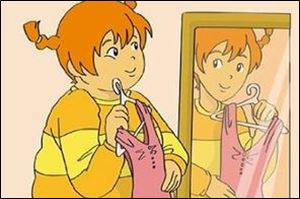
Book aimed at overweight kids draws fire
9/25/2011
The teen girl character in 'Maggie Goes on a Diet' envisions herself to be thinner.
For more than a decade, the nation has been immersed in debate about the obesity epidemic with significant focus on overweight children and adolescents who could face a lifetime of health issues.
Now a Hawaiian author, Paul Kramer, has written a children’s book about overweight adolescents, gaining substantial international attention — much of it critical — because of its message to overweight youngsters.
In Maggie Goes on a Diet, to be released next month, Mr. Kramer’s character — Maggie — becomes involved in sports, but has problems because of her weight. Maggie’s peers pick on her and poke fun at her. He tells her story in rhyme and she decides to diet by changing her eating habits, and as she loses weight she is able to move around more easily on the baseball field. As the pounds disappear, her social status improves.
The suggestion seems clear that being a certain size — thin — brings friends. But Mr. Kramer, a New York native, insists his book is "not about dieting."
"It’s a feel-good book," he said during a telephone interview from his home in Hawaii. His other children’s books include Bullies Beware!, Do Not Dread Wetting the Bed, Louie the Lobster Mobster, and Zeep Needs More Sleep.
Mr. Kramer believes the criticism stems from his use of the word "diet," which he says is not a "bad or dirty word." His intent is not for elementary age children to go on a diet, but that anyone of any age who is obese can change their eating habits and exercise.
"But the association is that people have seen the word ‘diet’ and a chubby girl looking in a stand-up mirror picturing how she would look if she were thinner," he said. "I am not advocating that if you go on a diet and become thinner that you automatically would be happier. But I am advocating that if a person loses five, 10, or 20 pounds that they probably should be happier merely because of their ability [to achieve that accomplishment] and ... that should make them happy."
However, two local experts — a child psychologist and a licensed social worker who treats people with eating disorders — have different points of view. Amy Hanson-Akins, a licensed independent social worker and mental health therapist, takes a particularly critical stand.
"The social implications are huge. Sure, the person who wrote the book had good intentions, but what I see is just more reinforcement of negative stereotypes of weight bias. It re-emphasizes the drive for thinness, that thin is inherently superior," she said.
While Ms. Hanson-Akins says our culture needs to accept the "diversity of size," she advocates healthy eating and exercise. The book appears to be geared toward children much too young, she added.
Insisting that Maggie is condemned because of the book’s cover showing the character smiling at a thin version of herself in the mirror, Mr. Kramer said, "I don’t think there is anything in the book that’s damaging to anybody."
Not so, according to Ms. Hanson-Akins, who has treated eating disorders in adults and children and does health and wellness coaching.
"You see a young girl holding up a dress that will be small for her even when she loses weight," she said. "She is bullied into the weight loss. It’s like a victory for the bullies. The more people are told to lose weight, the more they kind of do the opposite out of stress."
Ms. Hanson-Akins also objects to likening size with social status. After losing weight, Maggie becomes popular.
"I think it’s harmful in terms of the message," she said. "It reinforces that we have to change who we are in order to be accepted."
Ms. Hanson-Akins said diets often open the door to eating disorders.
"And we know that eating disorders have the highest mortality rate of all mental disorders," she said. "I have a pit in my stomach because this is what I hear in terms of kids and adults I treat. We really need to look at shifting the paradigm altogether in regard to how we talk and about food and health. Diets are never advised for kids. Doing that is alarming. It’s telling them there is something inherently wrong with them."
Adrienne Fricker-Elhai, child psychologist and director of the Cullen Center, a part of Toledo Children’s Hospital, said the author was probably describing what many overweight children experience: They are teased and picked on and then turn to food for comfort.
"The problem is equating-self worth with size," Ms. Fricker-Elhai said. She said doesn’t think the book was "horrible, but it was so simplistic. It doesn’t take into account all the factors that could affect children feeling good about themselves and or not feeling good about themselves."
It is true, though, that more active people have a better self-image and tend to be more socially interactive, she added.
Ms. Fricker-Elhai acknowledged that Mr. Kramer may be getting flak in part because at the outset of the book, Maggie does not state that she appreciates any other quality about herself.
"Some of the messages we want our children to have. We want them to care about what they eat and be physically active. She kept trying in soccer and that’s very positive. I agree it’s a short book and I’m sure [the author’s] intention was very positive. But I’m concerned about not having more in there about self-worth and anything else about herself that she feels good about."
Contact Rose Russell at: 419-724-6178 or rrussell@theblade.com.